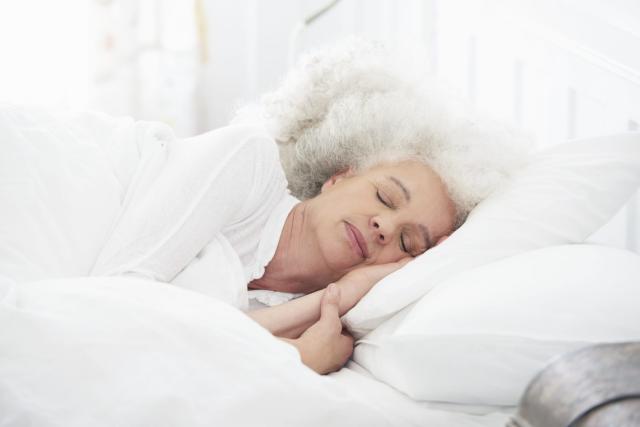As we age, there is a common belief that experiencing poor sleep is unavoidable. Factors such as chronic pain, medication side effects, and increased nighttime disruptions, including more frequent trips to the bathroom, impact both the amount and quality of our rest. This not only has consequences for physical well-being but also holds significance for cognitive health, as indicated by research presented at the Gerontological Society of America conference in November 2023.
Age-related sleep disruptions
While the necessity for sleep decreases from our teenage years, epidemiologist and sleep researcher Katie Stone from California Pacific Medical Center and the University of California, San Francisco, notes that most older individuals still require approximately seven hours of high-quality sleep each night. Nevertheless, the aging process is associated with shorter and more fragmented sleep patterns, with a reduction in time spent in slow-wave and rapid eye movement (REM) sleep, as observed by Stone and fellow sleep researchers. Furthermore, various age-related sleep disturbances, such as untreated sleep apnea and conditions like depression and anxiety, can significantly affect our cognitive well-being.
Sleep for better brain health
According to Stone, there is evidence suggesting that sleep plays a role in clearing Alzheimer’s-linked proteins from the brain. Sleep disruption, as noted by Stone, can lead to the accumulation of plaques like beta-amyloid, an early indicator of potential progression toward Alzheimer’s disease or dementia. Moreover, poor sleep is associated with inflammation and metabolic dysfunction, both linked to cognitive decline.
Researchers are increasingly comfortable directly associating poor sleep health with cognitive decline, considering the growing evidence supporting a potential causal relationship. However, what remains unclear is whether addressing sleep problems can effectively slow down cognitive decline. Ongoing research aims to determine if treating poor sleep not only prevents or delays cognitive function decline but also reduces the negative health effects associated with aging.
Stone’s extensive research on sleep and older adults, spanning decades, reveals that women may be more sensitive to sleep disruptions than men, with more sleep complaints and a higher prevalence of insomnia among women. Stone’s team, in a study involving 820 older adults enrolled in the Study of Muscle, Mobility, and Aging (SOMMA), found that individuals with greater sleep fragmentation and weaker 24-hour sleep-wake rhythms had significantly higher odds of cognitive impairment. Surprisingly, total sleep time had no impact on cognitive test performance in this analysis.
In a prior study, Stone and colleagues reported that individuals without dementia at the study’s onset but with poorer sleep quality were more likely to develop dementia over a five-year follow-up.
Gerontologist Dr. Leslie Kernisan, a clinical instructor in the UCSF division of geriatrics and host of the Better Health While Aging podcast, explains that various factors can contribute to disrupted sleep in older adults. These include breathing disorders like sleep apnea or COPD, chronic heartburn, arthritis, overactive bladder, and neurodegenerative diseases like Alzheimer’s or Parkinson’s. Additionally, medication side effects play a significant role, with nearly 90% of people over 65 taking at least one prescription daily, and more than a third on five or more prescriptions. This medication cycle, involving sleep aids and subsequent daytime napping, can make it challenging to establish a healthy sleep routine. Certain sleep medications have also been linked to an increased risk of dementia, as highlighted in another UCSF study, with a potential risk elevation of up to 79%.
Apart from the conventional recommendations for improving sleep, like powering down electronic devices and creating a comfortable, dark environment in your bedroom, Stone also proposes the following strategies:
1. Work with a health provider to address sleep problems rather than just self-medicating
Though some individuals strongly advocate for supplements such as melatonin or the use of combined pain relievers and sleep aids, Stone emphasizes that these approaches frequently prove ineffective and may result in additional problems, such as an elevated risk of falls when getting out of bed. Furthermore, the long-term effects of certain medications remain unclear, raising concerns about potential harm over time.
2. Consider cognitive behavioral therapy for insomnia symptoms
Cognitive behavioral therapy, when consistently maintained over the long term, proves to be more effective and exhibits a more enduring impact compared to medications. It stands as the primary treatment for insomnia recommended by the American College of Physicians and various other health organizations.
3. Don’t shy away from talking to your healthcare provider about your sleep issues
Your doctor can diagnose and treat various sleep disorders, such as sleep apnea, without the need for medication.
4. Make sleep health a priority
According to Stone, sleep is as crucial for older individuals as maintaining a balanced diet and engaging in regular exercise. Despite being sometimes disregarded as an inevitable downside of aging, it constitutes an equally vital element of overall health, and there are actionable steps that can be taken to address it.



